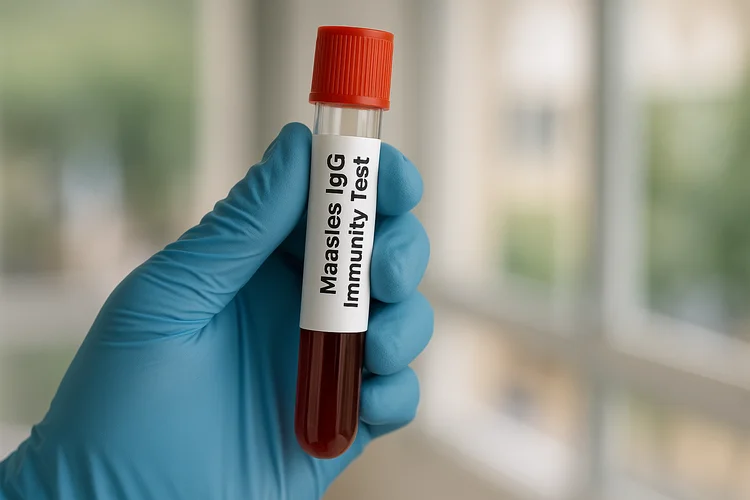Measles IgG Immunity Test
Last updated: Dec 20, 2025
What Is a Measles IgG Immunity Test?
The measles IgG immunity test is a serological blood test
that identifies IgG antibodies targeting the measles virus, revealing whether your body has
developed immunity to the infection.
By analysing your antibody levels, this test determines if you have had measles before or
received effective vaccination. It is frequently requested for employment requirements,
medical clearance, or personal health planning, and helps inform whether additional
vaccination is necessary.

How Does the Measles IgG Immunity Test Work?
The measles IgG immunity test involves taking a blood sample to check for immunoglobulin G (IgG) antibodies that respond to
the measles virus.
IgG is a type of antibody produced by the immune system after a past infection or vaccination. These
antibodies are part of the body’s long-term immune response and typically remain in the bloodstream
for life after exposure or immunisation.
If IgG antibodies are detected, it usually indicates that you have developed immunity and are
protected against measles. If no antibodies are found, you may be at risk of infection.
When Should You Consider a Measles IgG Test?
A measles IgG test may be considered if you are unsure of your vaccination history or need to
confirm your immunity for medical, occupational, educational, or travel-related purposes.
The test is often recommended for:
- Adults without documented evidence of prior measles vaccination.
- Individuals born before routine measles vaccination became standard.
- Healthcare workers and others in high-exposure environments.
- Travellers to areas where measles is still circulating.
- Enrolling in universities or institutions that require proof of immunity.
- Pregnant and do not have documented immunity.
- People with weakened immune systems.
If you are unsure whether this test is suitable for you, consult a doctor for individualised guidance.
What Do Measles IgG Immunity Test Results Mean?
Measles IgG test results are interpreted based on the level of antibodies detected in your blood, often expressed as a measles IgG antibody index or compared against a reference measles IgG range. Results are usually categorised as positive, negative, or equivocal.
- Positive Result – IgG antibodies are present, and your antibody index falls within the immune range, indicating that you are likely protected against measles.
- Negative Result – No measurable IgG antibodies are detected, or your index is below the defined immune threshold, suggesting that you may be susceptible to measles and could benefit from vaccination.
- Equivocal Result – Your antibody index falls in a borderline range, and immunity status cannot be clearly confirmed; a repeat test or further clinical evaluation may be advised.
Your doctor will review your results alongside your medical history and vaccination records to determine the appropriate next steps.

Measles IgG Immunity Test Cost
At ATA Medical, we offer measles IgG immunity testing along with a range of related tests and vaccinations. Prices are as follows:
| Test / Vaccinations | Price* |
|---|---|
| Consultation | From $49.05 |
| Immunity Testing | |
| Measles IgG Antibody | $100.28 |
| Mumps IgG Antibody | $144.97 |
| Rubella IgG Antibody | $28.34 |
| Varicella-Zoster IgG Antibody | $49.05 |
| Hepatitis Bs Antigen & Antibody | $21.80 |
| Vaccinations | |
| Measles, Mumps, Rubella (MMR) Vaccine | From $0 per dose (depending on age and eligibility for CHAS, PG, or MG subsidies) |
| Varicella (Chickenpox) Vaccine | $103.55 per dose |
| Shingles Vaccine | $375 per dose |
| Hepatitis A & B Vaccine | From $54.50 per dose |
^Prices last updated on Jan 28, 2026. While every effort is made to keep pricing information up to date, please contact our team to confirm the latest rates.
How Long Does a Measles IgG Immunity Test Take?
The measles IgG immunity test typically takes 30 to 60 minutes at our clinic, depending on queue
times and appointment flow. This includes registration, consultation, and blood sample collection.
Test results are usually ready within 3 to 5 working days. Once available, your doctor will contact
you by phone or email to explain the findings and advise on any necessary follow-up.
How to Prepare for a Measles IgG Immunity Test?
No special preparation is required for a measles IgG immunity test. You may eat and drink normally
before your appointment, and fasting is not necessary.
If you are feeling unwell or are taking medications that may affect your immune response, inform
your doctor beforehand. They may advise whether the timing of your test should be adjusted for more
accurate results.
Where Can You Get a Measles IgG Immunity Test in Singapore?
ATA Medical @ Orchard
Nearest MRT: Orchard Boulevard Station (TE13)
Contact Number: 6223 0682
Email: camden@atamed.sg
Opening Hours:
Mon - Fri: 8:30 AM to 12:30 PM, 1:30 PM to 5:30 PM
Sat: 8:30 AM to 12:30 PM
Sun & PH: Closed
ATA Medical @ Tanjong Pagar
Nearest MRT: Tanjong Pagar Station (EW15)
Contact Number: 6223 0682
Email: hi@atamed.sg
Opening Hours:
Mon - Fri: 8:30 AM to 12:30 PM, 1:30 PM to 5:30 PM
Sat: 8:30 AM to 12:30 PM
Sun & PH: Closed
ATA Medical @ Jurong
Nearest MRT: Jurong East MRT Station (NS1/EW24)
Contact Number: 6348 6292
Email: jurong@atamed.sg
Opening Hours:
Mon - Fri: 8:30 AM to 12:30 PM, 1:30 PM to 5:30 PM
Sat: 8:30 AM to 12:30 PM
Sun & PH: Closed


